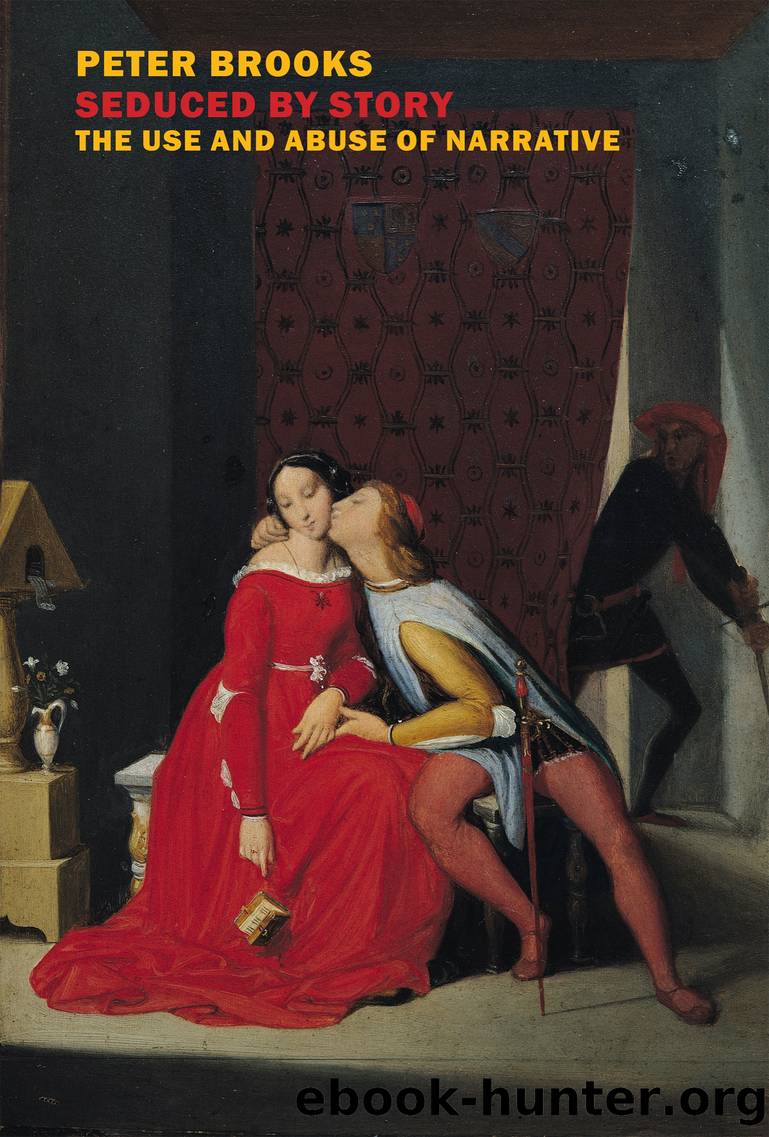Seduced by Story by Peter Brooks

Author:Peter Brooks
Language: eng
Format: epub
Publisher: New York Review Books
Published: 2022-10-18T00:00:00+00:00
Like Proust, Smith is alert to the movement between self and other that the imagination permits. He does not take Proustâs further step: that using a fictional person instead of âour brotherâ makes espousing his body and mind more complete, a substitution more than a simulation, and thus, paradoxically, a fuller realization of another kind of being in the world.
That is a potent argument in favor of fictions, a strong justification of our modern choice of the novel to represent everything we think we want to know, from past history to future dystopia as well as countless scenes of contemporary life. But we need also to recall what Proust tells us about the price paid for novelistic representation during the final pages of Time Regainedâpages of a triumphant joy at his vocation at last discovered, but with a dark undercurrent that we should not neglect. The discovery of his vocation means, for Marcel, the renunciation of those he has loved, destined to become imaginary figures in the fiction. Persons are erased by the novelist. Marcel calls a novel a âvast cemetery where on most of the gravestones one can no longer read the names that have been effaced.â14 Cognition is incorporate with extinction and destruction: people must die for the novel to live. The death of the novelist, too, is part of the life of the fiction: he is like Scheherazade, who tells stories to ward off death. The world of fictional characters has no place for the ârealâ and the âliving.â The power of novels to illuminate our lives depends on the alchemy that creates fictional beings as vessels of our consciousness. The novel, the instrument for seeing the world through the eyes of others, becomes in Time Regained an instrument for reading oneself with a renewed vision, turning, so to speak, the eyes of all those others on ourselves through the instrumentality of the novel.
What does this tell us about our quest to understand fictional characters and how we use them? Iâm not sure I can offer anything definitive here, but I would suggest that our love of fictional characters and our willingness to spend time with them and to let them seep into our everyday ârealâ lives, and also our reluctance to let go of them once our reading of the fiction is over, our continuing conversation about them, maybe with them, is largely as Proust describes it: a wish to travel from star to star through the vision provided by new sets of eyes, by new optical instruments. This is in the best of cases, in the novels we value most, not a passive or escapist process but one that has a cognitive and critical function. Character in the novel gives us, in the old yet still fresh words of Matthew Arnold, a âcriticism of life.â
The cognitive value of the fictional personâthat person as cognitive instrumentâboth affirms our traditional sense of the âreal lifeâ of literary characters and paradoxically returns those characters to our own minds, now enlarged by their encounter with imagined persons.
Download
This site does not store any files on its server. We only index and link to content provided by other sites. Please contact the content providers to delete copyright contents if any and email us, we'll remove relevant links or contents immediately.
The remains of the day by Kazuo Ishiguro(8961)
Tools of Titans by Timothy Ferriss(8357)
Giovanni's Room by James Baldwin(7313)
The Black Swan by Nassim Nicholas Taleb(7095)
Inner Engineering: A Yogi's Guide to Joy by Sadhguru(6780)
The Way of Zen by Alan W. Watts(6589)
Asking the Right Questions: A Guide to Critical Thinking by M. Neil Browne & Stuart M. Keeley(5747)
The Power of Now: A Guide to Spiritual Enlightenment by Eckhart Tolle(5740)
The Six Wives Of Henry VIII (WOMEN IN HISTORY) by Fraser Antonia(5492)
Astrophysics for People in a Hurry by Neil DeGrasse Tyson(5172)
Housekeeping by Marilynne Robinson(4429)
12 Rules for Life by Jordan B. Peterson(4298)
Double Down (Diary of a Wimpy Kid Book 11) by Jeff Kinney(4257)
The Ethical Slut by Janet W. Hardy(4235)
Skin in the Game by Nassim Nicholas Taleb(4229)
Ikigai by Héctor García & Francesc Miralles(4228)
The Art of Happiness by The Dalai Lama(4118)
Skin in the Game: Hidden Asymmetries in Daily Life by Nassim Nicholas Taleb(3983)
Walking by Henry David Thoreau(3946)
